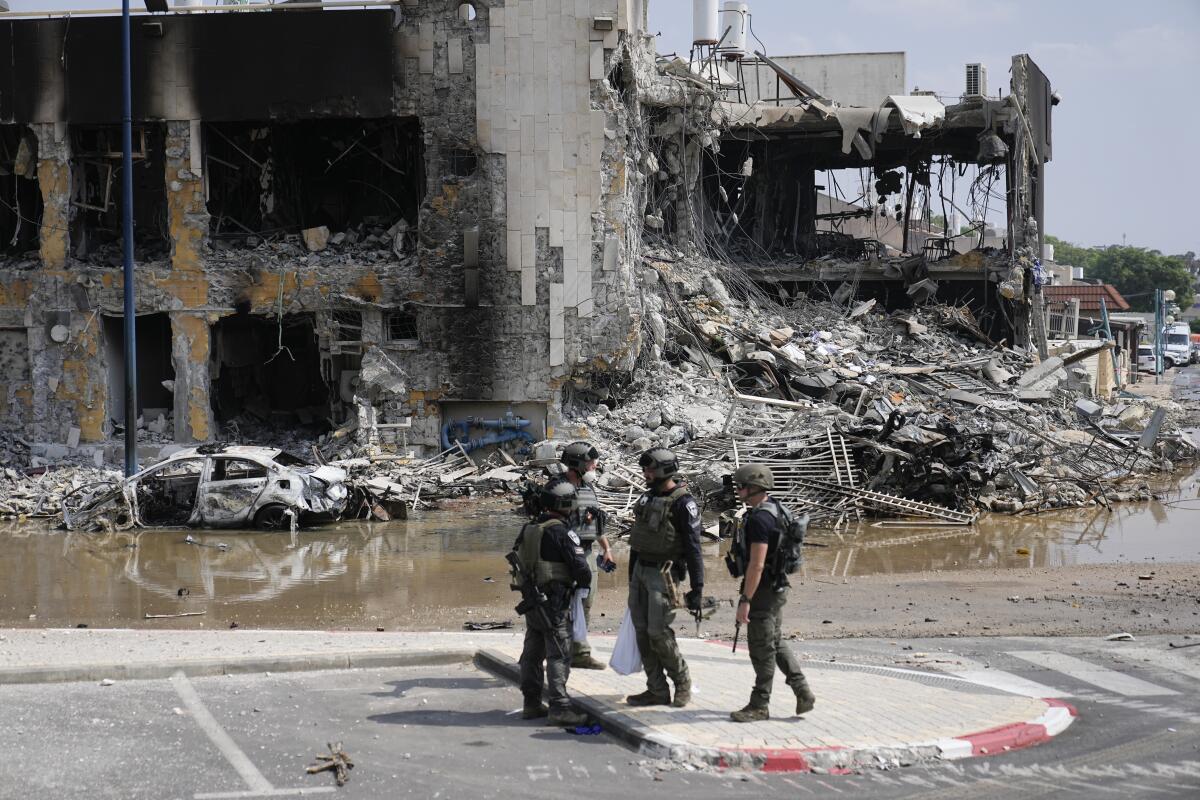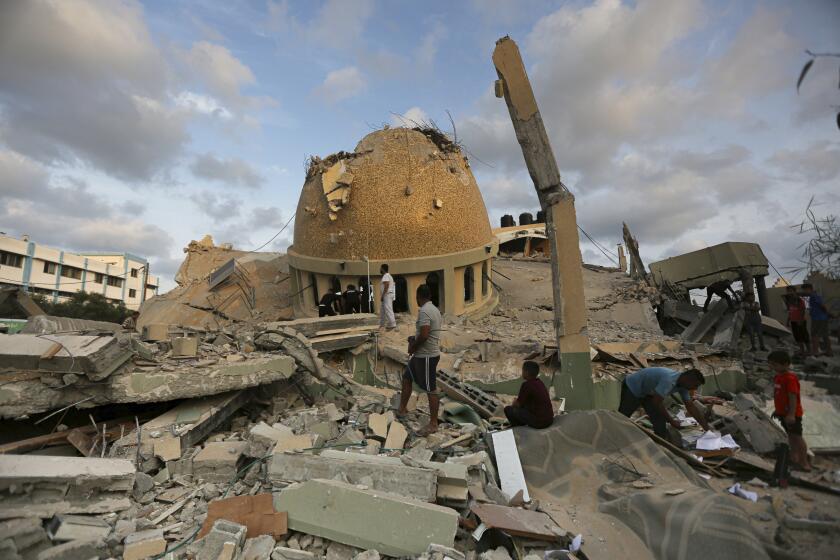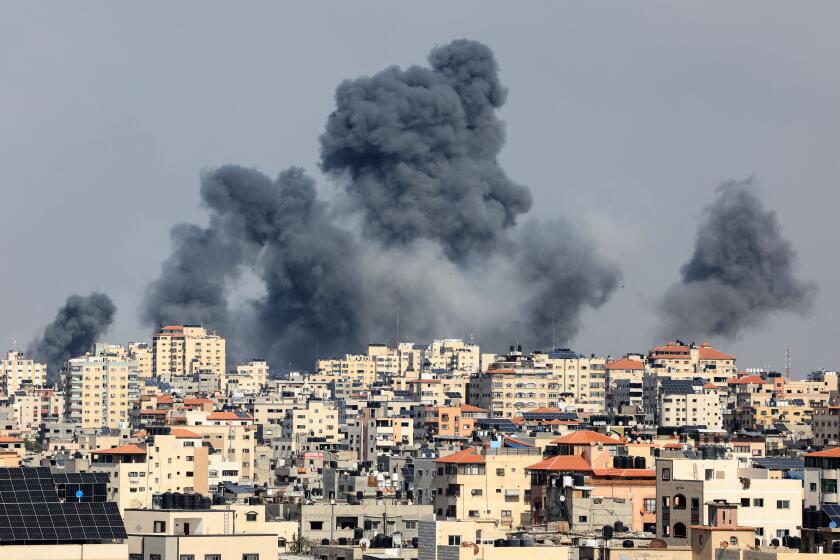Opinion: The Hamas attack tore off Israel’s veneer of invincibility. Is there a sustainable path forward?

- Share via
Fifty years ago, almost to the day in 1973, Egyptian and Syrian forces invaded Israel in a surprise attack on the holiest day of the Jewish year, Yom Kippur. Not only were many Israelis unprepared because they were in synagogue or otherwise marking the solemn fast day, but Israeli intelligence agencies had failed to take seriously the threat of an attack by Egypt, Israel’s largest neighbor and foe.
The prevailing “concept” (known in Hebrew as the “konceptzia”) was that Arab armies would not undertake a war that they were not certain to win. This turned out to be a colossal mistake, as Egyptian and Syrian forces overwhelmed Israeli defenses for three days, inflicting heavy losses on the army and leading many to believe that Israel’s end had come.
A possibly protracted — and broadened — Middle East conflict looms as Israel and Hamas militants trade fire, leaving hundreds dead on both sides.
And now in 2023, a major enemy of Israel, Hamas, launched a stunning attack on a day marked by the convergence of the Jewish sabbath and the holiday of Simchat Torah (one of the most celebratory days in the Jewish calendar). Unlike in 1973, this attack was directed against civilians, as well as the military, and the results have been devastating. The death toll from the massacre is rising by the hour.
Thousands of rockets were unleashed against Israel, reaching from the south of the country to the metropolitan center of Tel Aviv. More shockingly, Hamas militants easily overran Israeli defenses, invading military bases and 22 communities near the Gaza border; they went door to door looking for Jews to murder or kidnap back to the Gaza Strip. Every Israeli Jew and many Jews in the diaspora know someone who was harmed; at least three relatives of friends of mine were murdered, and three more kidnapped.
While the timing and element of surprise hark back to 1973, the scope, sophistication and brutality of the Hamas assault were unprecedented. Israeli leaders have made amply clear that there will be a massive response, one that will be different from previous Gaza operations by orders of magnitude.
The sudden war in Israel and Gaza upends political calculations as violence hits a scale not seen in decades.
Prime Minister Benjamin Netanyahu has promised “mighty vengeance for this black day.” Given that prior Israeli military operations in Gaza have led, as did Operation Protective Edge in 2014, to thousands of deaths of Gazans and billions of dollars of property destruction, it is terrifying to imagine how many Palestinian lives will be lost — and what, of Gaza, will remain intact.
The impending military operation cannot mask the monumental failure of Israeli intelligence, perhaps greater in scale than 1973. It seems beyond belief, given Israel’s huge investment in human and electronic intelligence assets, that an attack of this size could not be readily detected, even weeks before being launched.
As in 1973, this failure has torn off the veneer of Israeli invincibility. In the wake of the Yom Kippur War, the new awareness of Israeli vulnerability led to a major strategic recalibration, a shattering of the old paradigm of unavoidable hostility. Israel came to believe that achieving peace with its major enemy, Egypt, was a viable and necessary path forward. Egypt, for its part, had regained a measure of credibility following the 1967 War and now could consider talks with Israel. By 1978, the two countries entered into negotiations that yielded a peace treaty.
Leaders in Southern California denounced the deadly attack by Hamas and moved to bolster security at local Jewish sites.
Now, in the wake of the Hamas attack on Saturday, the newly exposed Israeli vulnerability could lead to its own strategic recalibration. The Palestinians do not pose a serious threat to the existence of Israel, but they can inflict grave damage on the Israeli body and psyche. They are not going to disappear. Nor are they going to surrender their claims to self-determination. And they are not going to give up the fight against Israel’s dehumanizing occupation of 56 years.
One way forward is the path of vengeance declared by Benjamin Netanyahu. It will lead to further devastation and the rising up of a new generation of Palestinians intent on retribution, which will only retrigger the cycle of violence that has engulfed this region for a century. Vengeance will only lead to more vengeance. Sadly, it is the likeliest course.
Another path forward, which requires bold and courageous leadership, is again breaking with the old paradigm of eternal enmity. It would entail recognition by Israel that it cannot batter Palestinians into submission, who deserve and must receive full rights as individuals and as a national collective. Bringing an end to the stranglehold of the occupation may be the best chance to break the cycle of violence.
Today, it is very hard to imagine such a step in this moment of grief and rage. But one makes peace with one’s enemies, not one’s friends. And as far-fetched as it may seem, it was precisely this kind of rethinking that was perhaps the most important legacy of the Yom Kippur War.
David N. Myers teaches Jewish history at UCLA, where he serves as director of the Luskin Center for History and Policy and the Initiative to Study Hate.
More to Read
A cure for the common opinion
Get thought-provoking perspectives with our weekly newsletter.
You may occasionally receive promotional content from the Los Angeles Times.













